Comes the Comer
A history of Jewish literacy remains to be written. It will be a colorful and complicated work, as befits the variegated linguistic history of the Jews, and for American Jewish readers of our day, I mean the honest ones, it will be a disturbing work. Whereas the Jews have always used many languages, Jewish and non-Jewish ones, and whereas complaints about the faltering level of competence in Hebrew appear in many medieval and modern sources, the awful fact is that Jewry of the United States has decided—it was a decision, even if it was never formally made—that the Jewish tradition may be adequately received, developed, and transmitted not in a Jewish language. Judaism’s language, after all, is not English. Owing to the magnitude of their illiteracy, American Jews have broken new ground in Jewish incompetence. Translation is an ancient Jewish activity, of course—the sanctity of the Hebrew language notwithstanding, the rabbis always insisted that Jews understand the sacred words that they read and hear and utter. Meaningfulness sometimes demands accommodations and adjustments, and we are the enemies of meaninglessness. But no Jewry has ever been as pathetically dependent upon translation as American Jewry.
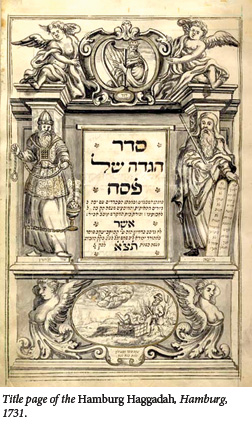 The comprehensibility of the liturgy—and the Haggadah is the most extensive liturgical text for use outside the synagogue—was always a premise of Jewish prayer. In the case of the Haggadah, the imperative of translation was no doubt enhanced by the pedagogical character of the commemoration of the Exodus at the Passover meal: It was designed as an education for the children. But in the cultural eddies of the diaspora the “children” often included the adults, who also had a need for a vernacular version of what was being read and sung. The first translations of the Haggadah into Jewish languages—Judeo-Italian, Judeo-German, and Judeo-Spanish—were published in 1609, and the first translations into a non-Jewish language—Spanish—appeared in 1620. (A translation into Latin was made in 1512, but not by Jews and not for Jews.) In 1770, the first Haggadah published in London included its first translation into English. The first American Haggadah, produced in 1837, also had an accompanying translation into English. There have been many English translations since, most of them mediocre or worse.
The comprehensibility of the liturgy—and the Haggadah is the most extensive liturgical text for use outside the synagogue—was always a premise of Jewish prayer. In the case of the Haggadah, the imperative of translation was no doubt enhanced by the pedagogical character of the commemoration of the Exodus at the Passover meal: It was designed as an education for the children. But in the cultural eddies of the diaspora the “children” often included the adults, who also had a need for a vernacular version of what was being read and sung. The first translations of the Haggadah into Jewish languages—Judeo-Italian, Judeo-German, and Judeo-Spanish—were published in 1609, and the first translations into a non-Jewish language—Spanish—appeared in 1620. (A translation into Latin was made in 1512, but not by Jews and not for Jews.) In 1770, the first Haggadah published in London included its first translation into English. The first American Haggadah, produced in 1837, also had an accompanying translation into English. There have been many English translations since, most of them mediocre or worse.
Now the New American Haggadah has appeared, in a translation by Nathan Englander that takes its place, alas, in that sad line. Englander, who is one of the very few American Jewish writers who knows our people’s language, has some fine solutions—”from grief to good days” for me-evel le-yom tov, or the Tetragrammaton rendered as “the One Who Brings Being into Being,” which is genuinely thoughtful—but generally he strains too much, and frequently ends up with versions that are awkward, ugly, or wrong.
The trouble begins almost at the beginning, with his rendering of the She-hecheyanu blessing: “You are blessed, Lord God-of-Us, King of the Cosmos, who breathed life, and sustained life, and shepherded us through to the current season.” What is this “God-of-Us”? Why torture one of the most common and comprehensible words in Jewish worship? Englander retains this infelicitous locution for all the blessings in the Haggadah. But eloheinu is a limpidly clear word: it means “our God.” And “our God” is more intimate, and therefore more provocative, than Englander’s hyphenate version—it is a possessive, grammatically and theologically. “Cosmos” is fine for olam, I guess, though the Greekness of the term jars in this context. But there are no sheep anywhere in the She-hecheyanu, so nobody could have been shepherded. As for “the current season”: it sounds like the hackwork of a music critic or a sports writer, and misrepresents the nature of the birkat ha-zeman, or “the blessing over time.” The time that the She-hecheyanu hallows is not a mere now. It is cyclical time. The blessing is prescribed for a moment that has come round again, an appointed hour that regularly arrives. We give gratitude for witnessing another turn in the turning without end, and therefore perhaps for catching a glimpse of eternity. This moment is not current; this moment is recurrent.
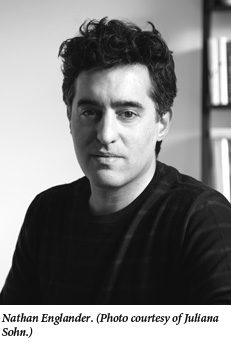 Or consider Englander’s version of “Barukh ha-makom, barukh hu.” Ha-makom means “the place”: It is the canonical Jewish name for God that suggests His ubiquity, His nearness. The divine omnipresence is established, somewhat paradoxically, by localizing it: He is here because He is everywhere. This appellation is of great antiquity. The Mishnah reports that when the Sanhedrin certified the suitability of priests to serve in the Temple, it opened its benediction with the formula that appears in the Haggadah: “Barukh ha-makom barukh hu.” Englander translates it as, “Blessed is the One that is Space and the Source of Space, the One that is the World but Whom the World Cannot Contain, blessed is He.” This is ridiculously cumbersome, and could not be more unlike the original. What is striking about the Hebrew is its simplicity and its opacity: It says only “Blessed is The Place.” Englander has elected to do away with the simplicity by doing away with the opacity. To arrive at “The One that is the World but Whom the World Cannot Contain,” he may have consulted the midrash in which Jacob’s arrival at “the place” where he would dream of his ladder broaches the issue of such a spatialization of God, and it is concluded that “He is the place of the world but the world is not His place.” Ha-makom is a mysterious expression for the universal incorporeal atemporal deity in whom Jews believe: Even Rav Ami, at the end of the 3rd century, was moved to ask, “Why is God called by a name that describes Him as a place?” Englander has taken it upon himself to eliminate the mystery, as if this is an improvement. The result is a pretentious upper-case mouthful that destroys the surprise and the stimulation of the original.
Or consider Englander’s version of “Barukh ha-makom, barukh hu.” Ha-makom means “the place”: It is the canonical Jewish name for God that suggests His ubiquity, His nearness. The divine omnipresence is established, somewhat paradoxically, by localizing it: He is here because He is everywhere. This appellation is of great antiquity. The Mishnah reports that when the Sanhedrin certified the suitability of priests to serve in the Temple, it opened its benediction with the formula that appears in the Haggadah: “Barukh ha-makom barukh hu.” Englander translates it as, “Blessed is the One that is Space and the Source of Space, the One that is the World but Whom the World Cannot Contain, blessed is He.” This is ridiculously cumbersome, and could not be more unlike the original. What is striking about the Hebrew is its simplicity and its opacity: It says only “Blessed is The Place.” Englander has elected to do away with the simplicity by doing away with the opacity. To arrive at “The One that is the World but Whom the World Cannot Contain,” he may have consulted the midrash in which Jacob’s arrival at “the place” where he would dream of his ladder broaches the issue of such a spatialization of God, and it is concluded that “He is the place of the world but the world is not His place.” Ha-makom is a mysterious expression for the universal incorporeal atemporal deity in whom Jews believe: Even Rav Ami, at the end of the 3rd century, was moved to ask, “Why is God called by a name that describes Him as a place?” Englander has taken it upon himself to eliminate the mystery, as if this is an improvement. The result is a pretentious upper-case mouthful that destroys the surprise and the stimulation of the original.
All translation is interpretation, since it is a choice among meanings; but translation is not the same activity as interpretation. A good translation of a troubling text will preserve the reason for the trouble, and thereby leave open the gates of interpretation. The great Thomist historian of philosophy Etienne Gilson, who served on the French delegation to the San Francisco Conference in 1945, rejected a French translation of the United Nations Charter because it erased certain cunning ambiguities in the original, observing that “il faut traduire le texte dans tout son obscurité.” One must translate the text in all its obscurity: The fidelity of the translator must include a commitment to honoring the density and the alienness of the original. The translator must not preempt the mental toil of the reader. But Englander has a different approach. He wishes to leave no darkness behind. (Except in his translation of the list of the plagues, where he swells choshekh, or “darkness,” into “a clotted darkness—too thick to pass,” which nicely describes this procedure of translation.) Thus he offers the standard opening formula for the blessing that precedes the performance of all ordained ritual or liturgical actions—Barukh ata adonai eloheinu melekh ha-olam asher kidshanu be-mitzvotav“—as “You are blessed, Lord God-of-Us, who has set us apart with his mitzvot.” Again Englander has taken the straightforward Hebrew and distorted it with a hermeneutical intrusion. “Asher kidshanu be-mitzvotav” means, quite uncontroversially, “who has sanctified us with His commandments.” There is nothing in it about being set apart. But Englander knows that the Jewish method of sanctification consists in differentiation, separation, the establishment of boundaries—in setting apart. It is good that he knows this. But what is gained by using this knowledge to expunge the plain meaning, the grand meaning, of the words? Sanctification is a big and magnificent concept, which provokes many ideas and feelings. Being set apart is a somewhat smaller idea, a more technical idea, an idea with implications that are not always elevating.
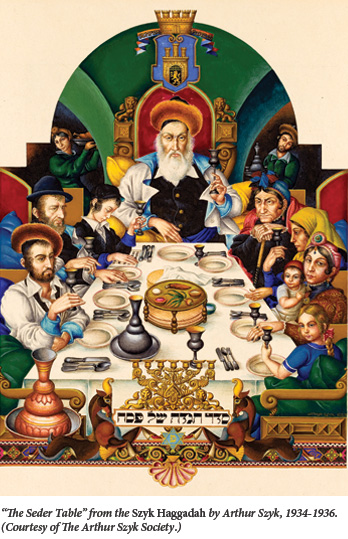 And why not translate mitzvot? It is hardly an esoteric term. A translation into English should be a translation into English: the whole text transposed into the new language, with no exceptions for hard or familiar words. The dignity of English must be respected. Later Englander leaves a reference to circumcision as brit (though he should have left it as brit milah, since in Hebrew usage brit alone does not refer to circumcision), and to God as “Hashem.” (Is it just me, or does that make God seem like an Arab?) This preservation of a few Hebrew words in English discourses on Jewish subjects is an American Jewish characteristic, the compromise of a community that is delinquent about its linguistic patrimony. Perhaps these stray survivals of the abandoned tongue mitigate the feeling of a fall, except that I do not detect any feeling of a fall. They certainly result in an argot that is neither English nor Hebrew, and is perennially ripe for parody. Englander’s reliance upon these traces of Hebrew vouches for the Americanness of his Haggadah. (In his ethnography of Jewish rites and manners, which he wrote in Italian, Leon
And why not translate mitzvot? It is hardly an esoteric term. A translation into English should be a translation into English: the whole text transposed into the new language, with no exceptions for hard or familiar words. The dignity of English must be respected. Later Englander leaves a reference to circumcision as brit (though he should have left it as brit milah, since in Hebrew usage brit alone does not refer to circumcision), and to God as “Hashem.” (Is it just me, or does that make God seem like an Arab?) This preservation of a few Hebrew words in English discourses on Jewish subjects is an American Jewish characteristic, the compromise of a community that is delinquent about its linguistic patrimony. Perhaps these stray survivals of the abandoned tongue mitigate the feeling of a fall, except that I do not detect any feeling of a fall. They certainly result in an argot that is neither English nor Hebrew, and is perennially ripe for parody. Englander’s reliance upon these traces of Hebrew vouches for the Americanness of his Haggadah. (In his ethnography of Jewish rites and manners, which he wrote in Italian, Leon
Modena reported in the 17th-century that “the common people everywhere conform themselves to the language of the nations where they inhabit, only mixing now and then a broken Hebrew word or two in their discourse with another.” But for his fellow Jews Modena still wrote in Hebrew.)
“Matzah” means—unproblematically, I thought—unleavened bread, but Englander prefers it to be “the poor man’s bread,” once again importing an explanation into a translation. The association of matzah with indigence is of course inaugurated a few moments later, in the stirring proclamation Ha lachma anya, “This is the bread of the poor”; but the Israelites who departed Egypt did not eat matzah because they were poor, they ate matzah because they were rushed. (They were not poor: they left the house of bondage laden with Egyptian gold and silver, the great wealth that God had promised Abraham for his liberated descendants.) Peri ha-adamah means emphatically not “the earth’s harvest,” but only “the fruit of the earth,” which is why the blessing is recited over vegetables and fruits. It is misleading to render Ba-avur zeh as “for this purpose,” because zeh is what philosophers call an ostensive definition: The reader who says “this” points to the matzah and the maror, the symbolic objects on the table, not abstractions but things, and defines them by showing them. It is preposterous to translate “Mi-techilah ovdei avodah zarah hayu avoteinu” as “At first our fathers were beholden to idols,” because the point of the passage—the point of the religion!—is that our ancestors were never beholden to idols, since idols are false and accomplish nothing.
When the text says that God, in his revelation to Abraham about the eventual emancipation of his descendants from Egyptian slavery, hishev et ha-ketz, determined the end, it refers to something larger than Englander’s trite “the end of an era.” It announces a trajectory of redemption so primary that the phrase was later adopted to describe the trajectory of the messiah. And what on earth does “The Aramean disappeared my father” mean? Was Laban a Latin American caudillo? Englander translates perishut derekh eretz, one of the torments that the Egyptians inflicted upon their Israelite slaves, as “a break with the natural order,” which is a clever reading of the literal sense of the words, except that the phrase has always denoted an abstention from sexual relations. This Egyptian cruelty was to work the Israelites so harshly that their erotic life was destroyed. And if slavery was the natural order in Egypt, why would the Israelites not have welcomed a break from it? Pakdeinu vo li-vracha cannot be “reminisce about us, during it, blessedly,” because it makes God’s remembrance of us, which is what we implore of Him, sound like an activity of celestial leisure. The affirmation yachid hu is not anything as banal as “unrivalled is He.” The term yachid expresses the radical conception of God’s unity, a singularity that precludes all comparison and competition, which is metaphysically fundamental to all the schools of Jewish theism.
When Englander ventures into the translation of the Seder’s Psalms—one ought to do so meekly, since the Englishing of the Psalms over the centuries is one of the great accomplishments of literature—he begins, in the preface to the Hallel, by having the worshippers “beautify” God, for le-hader, which is something of a theological insult. (I have a hunch that the verb reminded him of hidur mitzvah, the attention that the rabbis demand for the aesthetic dimension of ritual.) Then, in Psalm 113, he has God “poised above all other nations” when He is merely ram al kol goyim, or “sits high above” as Robert Alter lucidly has it, with no anxiety about the deity’s elegance and no fear that at any moment He may strike; and he has gevaot as “heights” when the dancing mountains, heharim, are the heights, and these lesser dancers are only the hills. It is absurd and anachronistic, in Psalm 126, to translate afikim as “wadis,” even if the backpacking was fun; and in the same passage to mangle the verse that the King James splendidly delivers as “He that goeth forth and weepeth, bearing precious seed, shall doubtless come again with rejoicing, bringing his sheaves with him,” as “Walks on the walker crying, bearing the sack of seed; then comes the comer, rejoicing, carrying his sheaves.” This is Englander’s most amateurish touch. “Comes the comer”—mercifully without that sack of seed!—is a ludicrous manner of suggesting the duplication of the root in bo yavo, a doubling that is designed to convey the psalmist’s confidence in the inevitability of joy, which the King James translators accomplish finely with their “doubtless.”
A similarly foolish extension of literalism to grammar occurs in Englander’s version of Psalm 115, where peh lahem, or “they have a mouth,” appears as “a mouth to them,” and gets increasingly clumsy as the mockery of the idols proceeds to “eyes to them,” “ears to them,” and “nose to them”: a translation must not be stranger than the original. In Psalm 118, ki amilam is a notoriously obscure phrase, which denotes some kind of destruction that the psalmist will visit upon his enemies, but Englander has “I will crush them like dried leaves” when there are no leaves to crush. Maybe Englander is recalling Rashi’s and Ibn Ezra’s association of the phrase amilam with yemollel ve-yavesh in Psalm 90, “cut down and withereth” in King James, which suggests the extinction of a plant; but maybe not.
Dayenu.
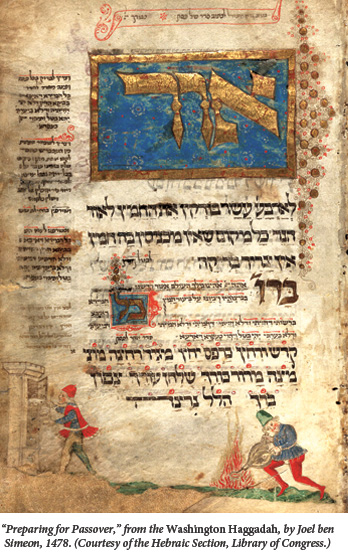 It was inevitable, given the unparalleled popularity of the Haggadah in Jewish life, and the historical and philosophical primacy of its themes, that commentaries upon it would be composed. The Haggadah is itself an exercise in commentary: its long central narrative is a collection of ancient rabbinical exegeses of the biblical verses that recount the Israelite experience of slavery and redemption. In 1975, Yosef Hayim Yerushalmi recorded that 437 commentaries on the Haggadah have been produced, noting mordantly that a Haggadah published in Galicia in 1905 advertised “238 commentaries and additions” on its title page. Some of the commentaries have become classics, such as Isaac Abravanel’s Zevach Pesach (Passover Sacrifice), which has been my steady Paschal companion for decades, and the Maharal’s Gevurot Hashem (The Mighty Deeds of God), a book-length interpretation of the Haggadah that is a significant contribution to the Jewish philosophy of history. (The richness of this body of commentary can be encountered in Rabbi Menachem Kasher’s Haggadah Sheleimah (Complete Haggadah), which appeared in 1967 and draws upon the full range of Jewish intellectual history from the 11th to the 18th century.)
It was inevitable, given the unparalleled popularity of the Haggadah in Jewish life, and the historical and philosophical primacy of its themes, that commentaries upon it would be composed. The Haggadah is itself an exercise in commentary: its long central narrative is a collection of ancient rabbinical exegeses of the biblical verses that recount the Israelite experience of slavery and redemption. In 1975, Yosef Hayim Yerushalmi recorded that 437 commentaries on the Haggadah have been produced, noting mordantly that a Haggadah published in Galicia in 1905 advertised “238 commentaries and additions” on its title page. Some of the commentaries have become classics, such as Isaac Abravanel’s Zevach Pesach (Passover Sacrifice), which has been my steady Paschal companion for decades, and the Maharal’s Gevurot Hashem (The Mighty Deeds of God), a book-length interpretation of the Haggadah that is a significant contribution to the Jewish philosophy of history. (The richness of this body of commentary can be encountered in Rabbi Menachem Kasher’s Haggadah Sheleimah (Complete Haggadah), which appeared in 1967 and draws upon the full range of Jewish intellectual history from the 11th to the 18th century.)
The New American Haggadah comes with four commentaries, which interpret ten passages of the text. They are sermonettes of varying quality, most of them keener on questions than answers. This is appropriate, I guess, for the night of the Four Questions; but those questions, remember, are for the children to ask. The adults are supposed to be less interrogative than instructive—to be unembarrassed by the claim that they are in possession of answers. Contrary to its contemporary reputation, the Haggadah is more about the prestige of answers than the prestige of questions. There is nothing tentative about its account of God, history, and freedom. The tradition that it describes does not shrink from certainties. It is an argumentative tradition, to be sure, but not because certainty is impossible or illegitimate. (And there are limits to its admiration of argument: the son who asks the most challenging question of all is called wicked. His question is not answered, it is scorned.) The grandeur of the Seder is owed not least to the intellectual confidence of its text. But such confidence is not to our liking anymore. We believe that truth is a form of hegemony. We suspect that pluralism may require perspectivism, or at least a denial of the possibility of objectivity. We wish to be right without anybody else being wrong. We prefer questions. And we like commentaries to be comments. Yet riffing is hardly an adequate response to God, history, and freedom. There are some subjects that cannot be blogged. (Brevity has nothing to do with it: Once upon a time a philosophy could be delivered in a few words. But who any longer has a philosophy?)
“Are there times when we should have resisted an unjust man-made law, and did not?” Jeffrey Goldberg asks at the end of his first commentary. And then, “How do we balance our faith’s demand to care especially for our fellow Jews, and care especially for the entire world?” And then, “Is the Haggadah telling us to get up right now from this table and find a hungry person to feed?” And then, “It is impossible to love the stranger as much as we love our own, but aren’t we still commanded to bring everyone out of Egypt?” And then, “Can we ever trust our emotions? Or is that why we have law—because we can’t?” And then, most bathetically, “Until that [messianic] day arrives, we will continue to gather around the Passover table, to remind ourselves, and each other of the work we must do. So, what are you going to do?” All excellent questions, all old questions. Some of the other commentators also choose to conclude their observations quizzically. One comes away with a new respect for the son who does not know how to ask. All this upspeak has the effect of turning Bnai Brak into Aspen. The New American Haggadah left me yearning for the assertiveness of interpretation, for the arrogance of a view, which is the excitement of exegesis.
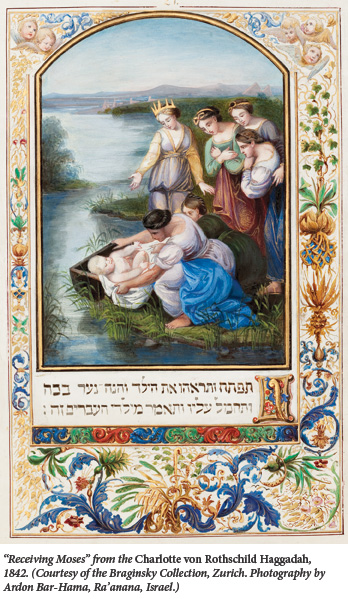 Goldberg’s subject is the politics of Passover. Never mind that talk of politics will hardly make this night different from all other nights, especially in a community whose Jewish identity is madly over-politicized. Goldberg comes to the Seder with the war in Iraq and the disproportionate representation of Jews in the Senate and the Arab Spring, as if our unleavened conversations should merely continue our leavened conversations. His comments are delivered in the tone of noisy worldliness, of tough-guy sentimentality, that marks all his writing. His reliance on cliché is considerable. “Dissatisfaction is a particularly Jewish characteristic.” “One of the joys in being Jewish is membership in a group that is eternally dissatisfied with the way things are.” “Is there something embedded in the Jewish cultural DNA—the memory of Moses’ calling, perhaps—that sparks a desire to change the world?” These observations are not only provincial, they are also imprecise. I do not see many American Jews waking every morning to the memory of Moses’ calling. We are living in a golden age of Jewish self-satisfaction. And the world is being changed by many people who are not Jews. “Passover is the most politically radical of all holidays,” Goldberg instructs, “in part because, as the scholar Nahum Sarna has noted, the book of Exodus contains the first known example in ancient literature of civil disobedience” in the Jewish midwives who defied Pharaoh’s order to kill the boys born to the Israelites. Thinking of Martin Luther King, Jr., he declares that the heroism of Shifrah and Puah illustrates a glorious fact about Judaism: that even though it is “a law-and-order religion” it insists that “the laws of man must be subjected to a vigorous test: whether or not they conform to moral law as set forth by God.” This is not quite true of Jewish law, which famously disregards the voice of Heaven in favor of the deliberation of men. And has Goldberg looked lately at some of the implementations in the Hebrew Bible of “the moral law as set forth by God”? For a modern liberal (what other kind is there?) they would justify civil disobedience against Moses, too.
Goldberg’s subject is the politics of Passover. Never mind that talk of politics will hardly make this night different from all other nights, especially in a community whose Jewish identity is madly over-politicized. Goldberg comes to the Seder with the war in Iraq and the disproportionate representation of Jews in the Senate and the Arab Spring, as if our unleavened conversations should merely continue our leavened conversations. His comments are delivered in the tone of noisy worldliness, of tough-guy sentimentality, that marks all his writing. His reliance on cliché is considerable. “Dissatisfaction is a particularly Jewish characteristic.” “One of the joys in being Jewish is membership in a group that is eternally dissatisfied with the way things are.” “Is there something embedded in the Jewish cultural DNA—the memory of Moses’ calling, perhaps—that sparks a desire to change the world?” These observations are not only provincial, they are also imprecise. I do not see many American Jews waking every morning to the memory of Moses’ calling. We are living in a golden age of Jewish self-satisfaction. And the world is being changed by many people who are not Jews. “Passover is the most politically radical of all holidays,” Goldberg instructs, “in part because, as the scholar Nahum Sarna has noted, the book of Exodus contains the first known example in ancient literature of civil disobedience” in the Jewish midwives who defied Pharaoh’s order to kill the boys born to the Israelites. Thinking of Martin Luther King, Jr., he declares that the heroism of Shifrah and Puah illustrates a glorious fact about Judaism: that even though it is “a law-and-order religion” it insists that “the laws of man must be subjected to a vigorous test: whether or not they conform to moral law as set forth by God.” This is not quite true of Jewish law, which famously disregards the voice of Heaven in favor of the deliberation of men. And has Goldberg looked lately at some of the implementations in the Hebrew Bible of “the moral law as set forth by God”? For a modern liberal (what other kind is there?) they would justify civil disobedience against Moses, too.
Goldberg is an exemplary American Jew in the contentment that accompanies his practice of introspection. He knows more about politics than he knows about Judaism. What can it possibly mean to claim that “feeding the hungry is in some ways the mother of all mitzvot”? When he worries about Jewish anger management, in the tenebrous moment when the Haggadah asks God to pour out His wrath against the unbelievers and the enemies of the Jews, he shows no awareness of the remarkable paucity of Jewish anger in Jewish liturgy (the prayer in the Haggadah that provokes Goldberg’s anxiety is a very abbreviated version of the one that appears in the medieval Machzor Vitry) or of the ferocious discussion of this issue among Jewish historians in recent years. And the relationship of observance to belief, of the performance of the commandments to the reasons for the commandments, is much more tangled than the conventional (and unwittingly Pauline) remark that “in Judaism, it is not the thought that counts, but the deed.”
Nathaniel Deutsch is the only one of the commentators who grounds his remarks—an inoffensive offering of kabbalistic and Hasidic ruminations—in rabbinical texts. The New American Haggadah is not exactly laden with Jewish learning. There are small deviations from the standard text, which dates back to Saadia Gaon’s siddur in the 10th century, but they are not explained; and a few midrashim are added, but with no word as to why or what for. The timeline by Mia Sara Bruch is a lively collection of literary and historical references to Passover, but it has too many fun facts and is not altogether reliable. The entry about Maimonides manages to err about his vocation, the date of his birth, and the spelling of his name. But not even this degree of intellectual lightness can justify the lame improv called “Playground” by the American Jewish writer who calls himself Lemony Snicket. If there is anything innovative about the New American Haggadah, it is the introduction into the Passover literature of this voice—puerile, trivializing, supercilious, calculatingly quirky, painfully unhilarious—a punk in a yarmulke. Here, for example, is his tiresome gloss on the Four Sons:
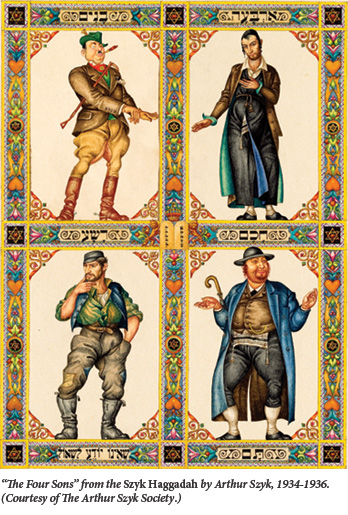 Some scholars believe there are four kinds of parents as well.
Some scholars believe there are four kinds of parents as well.
The Wise Parent is an utter bore. “Listen closely, because you are younger than I am,” says the Wise Parent, “and I will go on and on about Jewish history, based on some foggy memories of my own religious upbringing, as well as an article in a Jewish journal I have recently skimmed.” The Wise Parent must be faced with a small smile of dim interest.
The Wicked Parent tries to cram the story of our liberation into a set of narrow opinions about the world. “The Lord led us out of Egypt,” the Wicked Parent says, “which is why I support a bloodthirsty foreign policy and am tired of certain types of people causing problems.” The Wicked Parent should be told in a firm voice, “With a strong hand God rescued the Jews from bondage, but it was my own clumsy hand that spilled hot soup in your lap.”
The Simple Parent does not grasp the concept of freedom. “There will be no macaroons until you eat all your brisket,” says the Simple Parent, at a dinner honoring the liberation of oppressed peoples. “Also, stop slouching at the table.” In answer to such statements, the Wise Child will roll his eyes in the direction of the ceiling and declare, “Let my people go!”
The Parent Who Is Unable to Inquire has had too much wine, and should be excused from the table.
Is this the cry of a generation? A pitch for Zach Galifianakis? There is something sad about such a fear of adulthood. It is an Egypt of its own.
Respite finally comes in the commentary by Rebecca Newberger Goldstein. Her thoughts give evidence of a long wrestling with the text and its implications. She deftly brings Kafka and Proust to the table, and her meditation on the wailing of the oppressed is worthy of Levinas. Her speculation on the psychological undoing of the Egyptians by the plagues is acute and deeply moving. When Goldstein remarks about Spinoza, a wicked son if ever there was one, that “the people who disowned him have lived to flourish thanks to [his] changes,” she nicely captures the irony of religion after liberalism. About “next year in Jerusalem” she sharply observes that “we are slaves without our longings.” (I would add: and with our longings, too.) In her discussion of the ke’ilu, the transfiguring principle of the “as if” that enables us to regard ourselves as if we ourselves came out of Egypt, she grasps the centrality of the imagination to collective memory and, in the form of empathy, to moral life, and so her assertion that at the Seder “we sanctify storytelling” is more than the usual piety about narrativity.
But respites always pass. “This Haggadah makes no attempt to redefine what a Haggadah is,” writes Jonathan Safran Foer, the volume’s editor, in his brief preface. Why not? I would have thought that a redefining, a rethinking, a retelling, a reimagining, would have been the greatest adventure of all. “Like all Haggadahs before it,” he adds, “this one hopes to be replaced.” But some of the Haggadahs that preceded this one have not been replaced. They were works of spiritual and intellectual ambition. It is not immodest to aspire to imperishability; that is how tradition grows and why writers write. Anyway, there is immodesty in the notion that newness, and one’s own signature, will suffice. “It is not enough to speak Yiddish,” I. L. Peretz warned. “You must have something to say.” Those words should be blazoned above every Jewish writer’s desk. The New American Haggadah is abundantly a labor of love, but love is not enough.
Suggested Reading
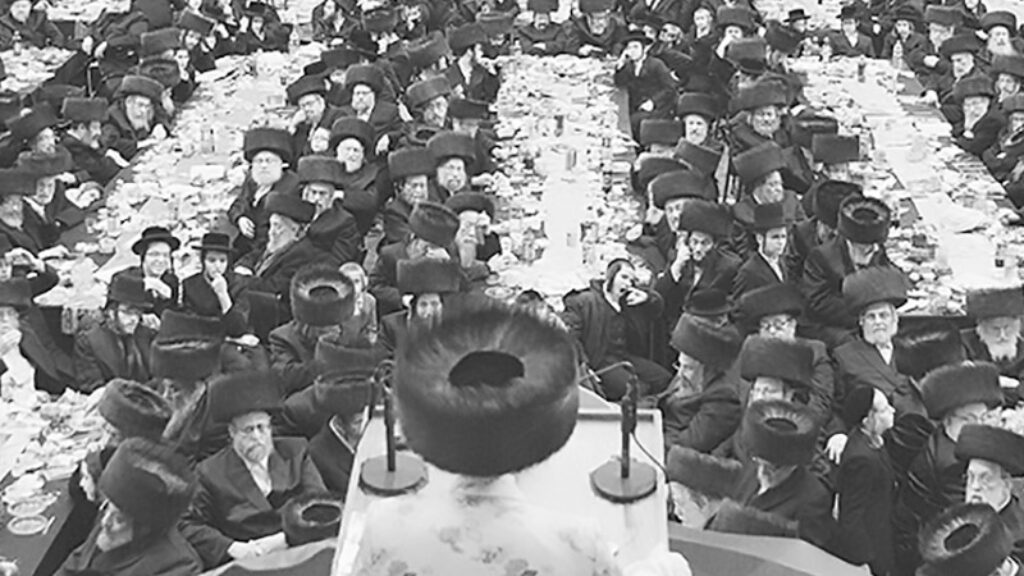
Satmar, American-Style
The explosive growth of Satmar Hasidim has shocked and worried many who see their culture as un-American. But two new books argue it was only in America that the sect could have flourished at all.
The Inklings
Leo Strauss may be as devastating as C. S. Lewis in his criticism of facile and destructive dogmas, but Hollywood isn’t planning a film version of Strauss’s Natural Right and History any time soon.
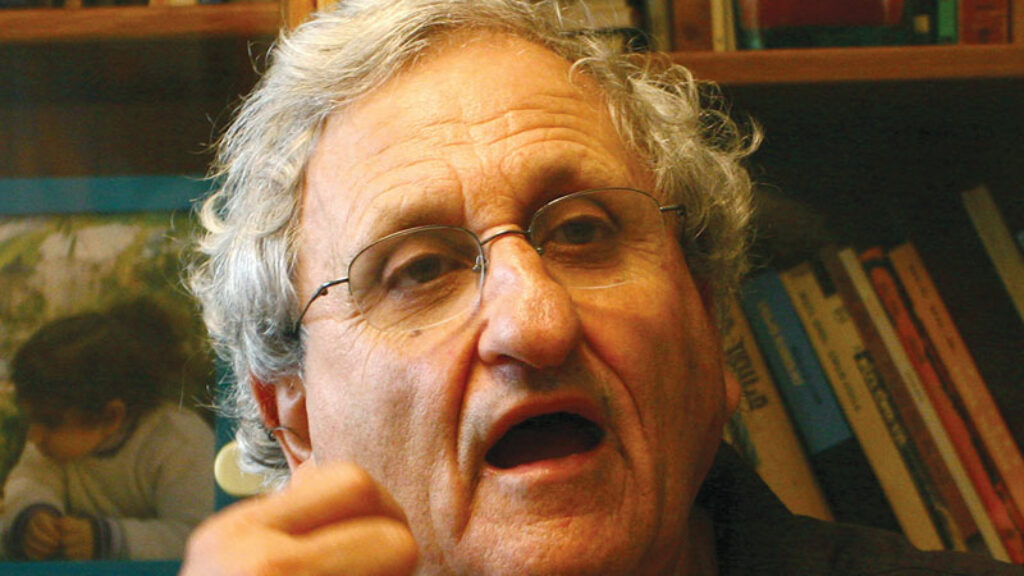
The Wry Comedy of A. B. Yehoshua
Remembering the ebullient spirit and radical fiction of A. B. Yehoshua.
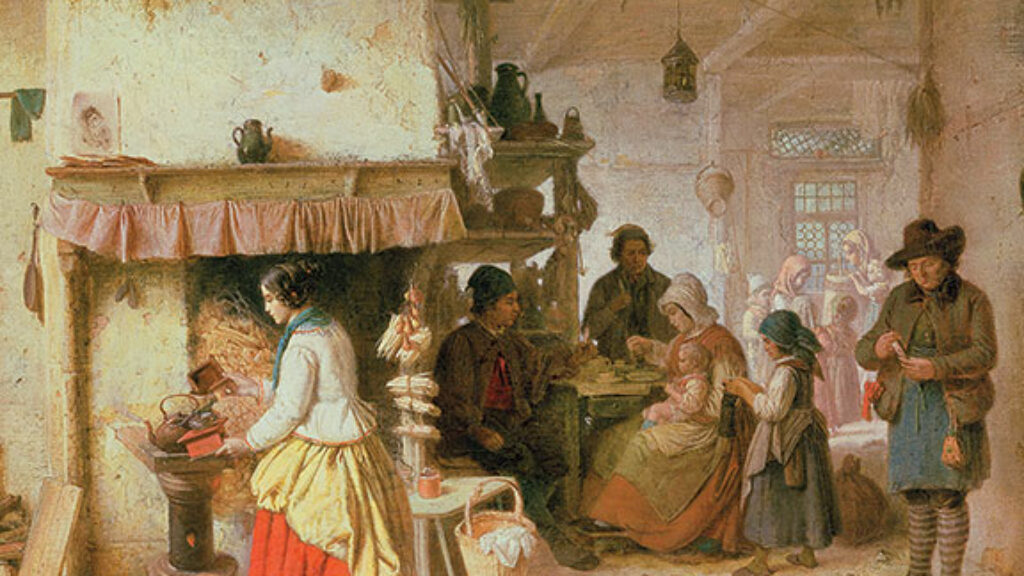
A Tale of Two Night Vigils
The tradition to stay up all night studying on Shavuot is far more well-known than the tradition to do so on Hoshana Rabbah. Neither would have been possible without Kabbalah and caffeine.
Comments
You must log in to comment Log In